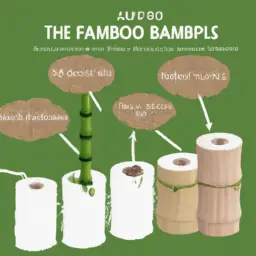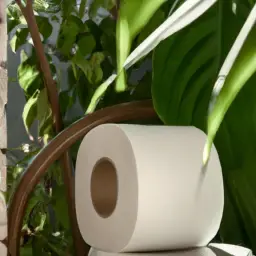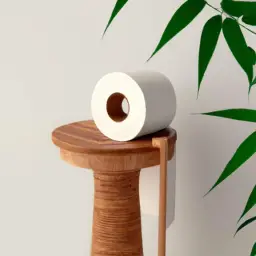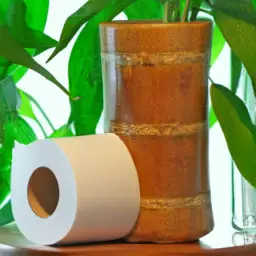I gotta tell you, I recently made a bathroom swap that has been a game-changer: bamboo toilet paper.
Hear me out, this sustainable alternative is making a positive impact on the environment. Not only is bamboo toilet paper softer and more durable, but it’s also biodegradable and requires fewer resources to produce.
In this article, I’ll share the benefits of making the switch and offer some tips for embracing this eco-friendly choice.
Trust me, you won’t regret it.
The Environmental Impact of Traditional Toilet Paper

I’ve always wondered about the environmental impact of traditional toilet paper. It seems like such a small thing, but when you think about how many rolls of toilet paper are used every day around the world, the consequences become significant.
Traditional toilet paper is made from virgin pulp, which comes from trees, usually from old-growth forests. This unsustainable manufacturing process leads to deforestation, a major environmental issue.
The consequences of deforestation are far-reaching. Trees play a crucial role in absorbing carbon dioxide and releasing oxygen, helping to mitigate climate change. When forests are cleared for toilet paper production, it not only destroys habitats for countless species but also disrupts the delicate balance of our ecosystems. Furthermore, the process of turning trees into toilet paper requires a significant amount of water and energy, contributing to pollution and greenhouse gas emissions.
Fortunately, there’s an alternative: bamboo toilet paper. Bamboo is a highly renewable resource that grows much faster than trees, making it a more sustainable option for manufacturing toilet paper. Bamboo also requires fewer pesticides and fertilizers to grow, reducing the environmental impact even further.
Why Bamboo Is a Sustainable Alternative

When it comes to finding a sustainable alternative to traditional toilet paper, bamboo is the way to go. Not only is bamboo a rapidly renewable resource, but its production process also has several benefits.
| Benefits | Production Process |
|---|---|
| Sustainable | Bamboo is one of the fastest-growing plants on the planet, making it a highly sustainable option for toilet paper production. Unlike trees, which take years to reach maturity, bamboo can be harvested in just three to five years. This means that bamboo can be replenished quickly, reducing the strain on natural resources. |
| Eco-friendly | Bamboo toilet paper production requires significantly less water and energy compared to traditional toilet paper made from trees. Additionally, bamboo plantations can help to reduce carbon dioxide levels, as bamboo absorbs more carbon dioxide and releases more oxygen than trees. |
| Soft and Strong | Bamboo toilet paper is known for its softness and strength. The fibers in bamboo are naturally long and flexible, resulting in a softer and smoother texture. Despite its gentleness, bamboo toilet paper is also durable and strong, ensuring that it does not tear easily during use. |
The Benefits of Using Bamboo Toilet Paper

Using bamboo toilet paper has numerous advantages that make it a great choice for a sustainable bathroom swap. One of the key benefits of bamboo toilet paper is its eco-friendliness. Bamboo is a highly sustainable resource as it’s one of the fastest-growing plants in the world. It can grow up to three feet in just 24 hours, making it an ideal choice for toilet paper production. Unlike traditional toilet paper made from trees, bamboo toilet paper doesn’t contribute to deforestation.
Another benefit of using bamboo toilet paper is its softness and strength. Bamboo fibers are naturally long and flexible, making the toilet paper soft and gentle on the skin. It provides a luxurious and comfortable experience without sacrificing durability. Bamboo toilet paper is also naturally hypoallergenic, making it suitable for people with sensitive skin or allergies.
Furthermore, bamboo toilet paper is biodegradable and compostable. It breaks down easily in water and decomposes quickly, reducing its impact on the environment. Unlike traditional toilet paper, which can take years to decompose, bamboo toilet paper is a more sustainable choice that helps to minimize waste.
How Bamboo Toilet Paper Is Made

To understand how bamboo toilet paper is made, it’s important to know the process from start to finish.
The production process of bamboo toilet paper begins with the harvesting of bamboo. Bamboo is a fast-growing grass that requires minimal water and no pesticides, making it an eco-friendly choice for sustainable products. Once the bamboo is harvested, it’s then transported to the manufacturing facility.
At the facility, the bamboo is cleaned and stripped of its outer layer. The stripped bamboo is then cut into smaller pieces and boiled to remove any impurities. After boiling, the bamboo is crushed and pulped to create a soft, fibrous material. This material is then mixed with water to form a pulp, which is then pressed and dried to create bamboo toilet paper sheets.
The innovative uses of bamboo in sustainable products have gained popularity in recent years. Bamboo has a high growth rate and can be harvested sustainably, making it an excellent alternative to traditional wood-based products. Bamboo toilet paper not only reduces the demand for virgin wood pulp but also helps to minimize deforestation and preserve natural habitats.
Comparing Bamboo Toilet Paper to Recycled Toilet Paper

I can compare bamboo toilet paper to recycled toilet paper based on their sustainability and environmental impact.
When it comes to sustainability, bamboo toilet paper has several benefits. First and foremost, bamboo is a highly renewable resource. It grows much faster than trees, making it a more sustainable option for toilet paper production. Additionally, bamboo requires minimal water and no pesticides or fertilizers to grow, reducing its environmental impact even further.
In terms of environmental impact, bamboo toilet paper also has an advantage over recycled toilet paper. The production of recycled toilet paper requires significant amounts of energy and water for the recycling process. On the other hand, bamboo toilet paper production is more energy-efficient and requires less water. This means that choosing bamboo toilet paper can help reduce energy consumption and conserve water resources.
Furthermore, bamboo toilet paper is biodegradable, which means it breaks down more easily in wastewater treatment systems compared to recycled toilet paper. This can help prevent clogs and reduce strain on sewage systems.
Tips for Making the Switch to Bamboo Toilet Paper

When transitioning to bamboo toilet paper, it’s important to gradually introduce it into your bathroom routine over a period of time. Making sustainable choices is a crucial step towards reducing our ecological footprint, and switching to bamboo toilet paper is a simple yet effective way to contribute.
To successfully make the switch, start by purchasing a small supply of bamboo toilet paper and use it alongside your regular toilet paper. This will allow you to get accustomed to its texture and performance. As you become more comfortable, gradually increase the amount of bamboo toilet paper you use.
One of the benefits of bamboo toilet paper is its sustainability. Bamboo is a fast-growing plant that requires minimal water and no pesticides to thrive. It’s also highly renewable, as it can be harvested in just a few years compared to the decades it takes for trees to grow. Additionally, bamboo toilet paper is biodegradable and breaks down easily, reducing the strain on our landfills.
Supporting Sustainable Practices With Bamboo Toilet Paper

By choosing bamboo toilet paper, I can actively support sustainable practices and contribute to the preservation of our environment. Not only is bamboo a highly renewable resource, but it also requires significantly less water and land compared to traditional toilet paper made from trees. Additionally, bamboo toilet paper is free from harmful chemicals, making it a safer choice for both our bodies and the planet.
To further emphasize the benefits of bamboo toilet paper, let’s take a look at some of the popular brands available in the market:
| Brand | Features |
|---|---|
| Bim Bam Boo | Made from 100% bamboo, plastic-free packaging |
| Pure Planet Club | Biodegradable and compostable, wrapped in recyclable paper |
| Reel | Plastic-free, each purchase supports sanitation projects in developing countries |
| Who Gives a Crap | Made from bamboo and recycled paper, donates 50% of profits to build toilets in developing countries |
| Tushy | Made from sustainably sourced bamboo, wrapped in recyclable packaging |
It is important to note that consumer awareness about sustainable bathroom products is on the rise. People are becoming more conscious of their impact on the environment and are actively seeking out eco-friendly alternatives. By choosing bamboo toilet paper, we can not only support sustainable practices, but also encourage others to make more environmentally conscious choices. Together, we can make a significant difference in preserving our planet for future generations.
Conclusion
In conclusion, making the switch to bamboo toilet paper is a simple and effective way to support sustainable practices in our daily lives.
Not only does it help reduce deforestation and water pollution, but it also offers numerous benefits such as being soft, strong, and biodegradable.
By choosing bamboo toilet paper, we can make a positive impact on the environment while still enjoying the comfort and convenience we’re accustomed to.


